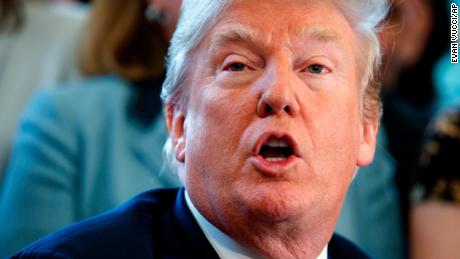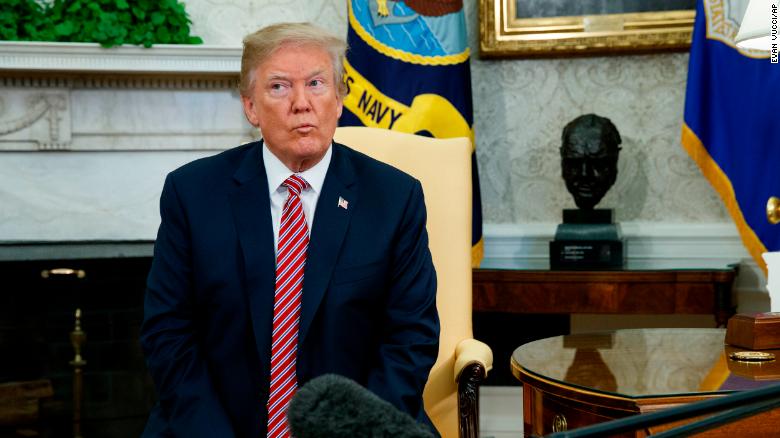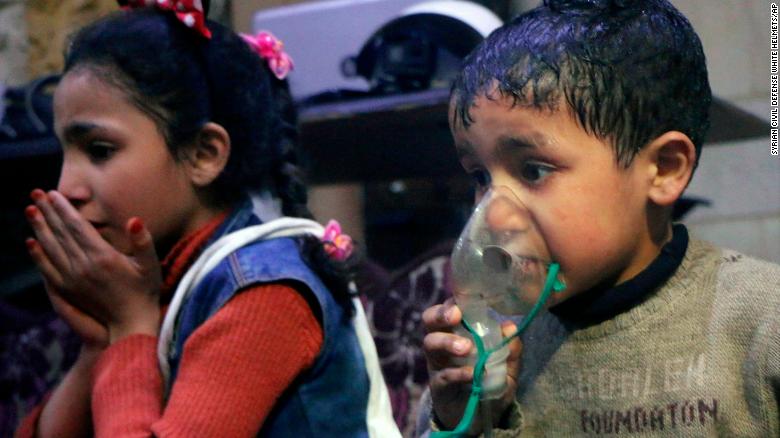A Syria decision hadn't been made when Trump tweeted missiles 'will be coming'
Washington (CNN)President Donald Trump's morning declaration that "nice and new and 'smart'" missiles would soon be fired toward Syria caught most of his aides off guard and came before an agreement had been reached between key US allies, multiple American and Western officials said on Wednesday.
That Trump would surprise staffers and allies with a morning tweet is not new; he regularly sets his own tone for the day on Twitter based on cable television and his own mood. But Wednesday's messages were unique in their telegraphing of upcoming US military action, something Trump vowed he would never do as president.
A final decision on how to respond to the weekend's chemical attack in Syria had not yet been made when Trump issued his tweet, the White House said later on Wednesday.
"We're maintaining that we have a number of options and all those options are still on the table. Final decisions haven't been made yet," press secretary Sarah Sanders said. "The President has a number of options at his disposal and all of those options remain on the table."
Top military officials were at the White House on Wednesday afternoon to discuss options for Syria, according to senior aides. Defense Secretary James Mattis and Gen. Joseph Dunford, the chairman of the Joint Chiefs of Staff, were seen entering the White House shortly after 1 p.m. ET and departing roughly two hours later.
Sanders said Vice President Mike Pence had chaired a meeting of the National Security Council to discuss Syria. But those talks came after Trump indicated on Twitter that missile strikes were in the works.
"Russia vows to shoot down any and all missiles fired at Syria. Get ready Russia, because they will be coming," Trump wrote early Wednesday. "You shouldn't be partners with a Gas Killing Animal who kills his people and enjoys it!"
While Trump did not specify when a missile strike might come or where it could target, the message made clear he plans retaliatory action soon for the suspected chemical gas attack that killed at least 40 people.
Sanders indicated to reporters that missile strikes were not his only option.
"That's certainly one option, but that doesn't mean it's the only option or the only thing that the President may or may not do," she said.
The President's message raised the ire of at least one influential Republican, Senate Foreign Relations chairman Bob Corker, who said on Wednesday he believes action should come soon.
"The only thing I worry about is that it's not going to happen," Corker said on Capitol Hill. "Now we're announcing what we're going to do and unfortunately it puts us in a place where possibly it creates a greater conflict."
Trump taunts Russia, says US military response coming in Syria
Trump remains engaged in intensive consultations with US partners, principally French President Emmanuel Macron and British Prime Minister Theresa May, on a coordinated response to the attack. But those leaders have yet to reach firm agreement on the scale or timing of a response, the officials said, and it's possible that strikes don't begin until the end of the week.
Trump has pressed his foreign counterparts and his aides to develop options that go further than strikes he ordered last year on a Syrian airfield in response to another chemical weapons attack. Those strikes did little to dampen the Syrian regime's abilities to carry out these type of attacks, and reports at the time indicated planes were taking off from the airstrip soon after the US strikes ended.
This time, Trump has pressed for a more muscular response that would more credibly deter Syrian leader Bashar al-Assad from carrying out chemical attacks on civilians in the future, officials said. But questions remain about how much bigger the response this time may be, and how willing US partners are to join in.
Coalition
US allies warn of action on suspected Syria chemical attack
US officials had suggested that parliamentary approval in the UK could hamper May's ability to join in a coordinated effort in a significant way, though on Wednesday May sounded firmer in her determination to join allies in responding to the attack. She has not said whether she will seek approval from MPs before approving any action, and Trump has pressed his counterparts that urgent steps are necessary, according to people familiar with the conversations.
Earlier this week, US officials said that a lack of firm evidence had led to concerns from May about launching strikes too early. But speaking in Birmingham on Wednesday, May said "all the indications" are that the Syrian regime was responsible for a chemical weapons attack in Douma, adding that the use of such weapons "cannot go unchallenged."
France also appears poised to play a leading role. Macron would not require parliamentary approval to launch strikes and he has described chemical weapons use as a red line that must be upheld.
While Trump has made clear he believes the Syrian regime is responsible for the attack, observers have struggled to gain access to the scene and neither the US nor its allies have been able to provide firm evidence of culpability.
Speaking Wednesday, Sanders nevertheless pinned the blame on Syria and its backers in Moscow.
"The President holds Syria and Russia responsible for this chemical weapons attack," she said.
Earlier Wednesday, Mattis told reporters the US was "still assessing the intelligence" on whether the Assad regime is to blame for the attack.
"We stand ready to provide military options if they are appropriate as the President determined," Mattis said.
Responding to Trump's Tweet, Russian Foreign Ministry spokeswoman Maria Zakharova wrote on Facebook that a missile strike could destroy evidence on the ground, interrupting the work of international investigators.
"Smart missiles should fly toward terrorists, not the legal government that has been fighting international terrorism for several years on its territory," Zakharova wrote.
Russia has blamed Syrian opposition forced for the alleged chemical attack. In subsequent tweets on Wednesday, Trump bemoaned the poor state of relations between Washington and Moscow, something he's vowed to fix as president.
Those efforts, he wrote, have been hindered by the special counsel's investigation into Russian election meddling.
News Courtesy: www.cnn.com













